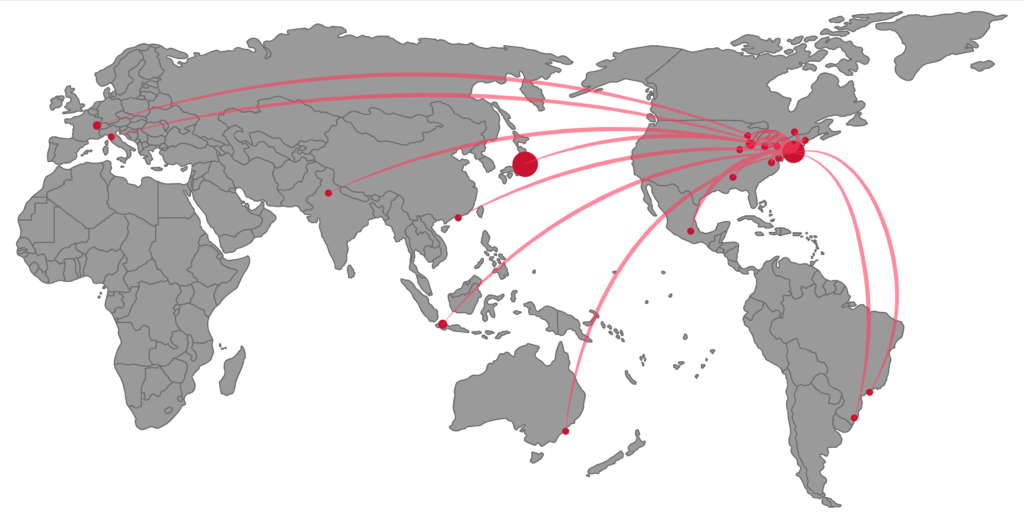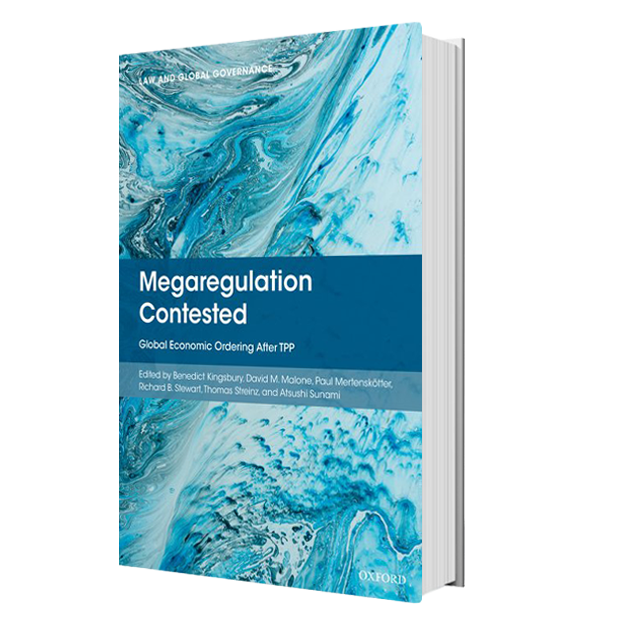Our book Megaregulation Contested: Global Economic Ordering After TPP (OUP 2019) is the result of a partnership between three institutions spanning the Pacific. Benedict Kingsbury, Richard B. Stewart, Paul Mertenskötter, and Thomas Streinz are based at New York University School of Law, where Kingsbury directs the Institute for International Law and Justice (IILJ). David M. Malone is Rector of the United Nations University in Tokyo and Under-Secretary General of the UN. Atsushi Sunami, a scholar of innovation and public policy, is Vice-President of the National Graduate Institute for Policy Studies (GRIPS) in Tokyo, Japan. He, and his collaborators at GRIPS, have been actively involved in TPP issues and in Japan’s regulatory reforms, including work with counterparts in other countries.
Genesis
Our book is about extended-scale megaregional economic regulation at a time when international economic governance is both buffeted by cross-winds and facing reversal by headwinds. The MegaReg project started in 2013, when governments in Europe, the Americas, Japan, and many Asia-Pacific and some African economies all were turning to negotiation of megaregulatory agreements (usually with non-public texts and meetings) as a means to manage global economic transformation, placate some powerful constituencies, and perhaps evade some critics and cross-winds. In common with other universities, a group of scholars interested in international economic law and governance at NYU School of Law, collectively focused on the growing significance of regulatory agendas in the newer generations of inter-governmental trade and investment agreements, including the implications of these for public interests and for development and justice priorities, and perceived a responsibility for universities to examine closely the assumptions, analytics, possibilities, choices, and preclusions entailed by the new megaregional initiatives. The IILJ has worked since 2002 on global regulatory governance, and has been active in supporting and participating in work drawing on the interests and anxieties of developing countries engaged in regulatory reform and trade links with others. It was thus a logical platform for study of the TPP, in which David M. Malone (based in Tokyo) readily joined. Taking account of the central importance of Japan to TPP as it developed, the other editors were delighted subsequently to be joined in this endeavor by Atsushi Sunami. A series of intensive workshops of draft papers was held, with graduate students also often participating. Full-scale conferences were convened in New York and Tokyo, focusing on different aspects of the project in tandem also with the change in dynamic from TPP into CPTPP, through to its entry into force in December 2018.
Authors
We are delighted that the volume in its final form includes authors from some fifteen jurisdictions in Asia, Oceania, and the Americas, as well as several from Europe. These include lawyers, economists, and political scientists, in an unusual mix of career academics and people with high-level political, diplomatic, and legal or policy experience.
Kiyoshi Adachi, UN Conference on Trade And Development (UNCTAD), Geneva
Wahyuni Bahar, Bahar & Partners, Jakarta.
Pornipum Chantapacdepong, Asian Development Bank Institute (ADBI), Tokyo.
B. S. Chimni, Jawaharlal Nehru University, New Delhi.
Dan Ciuriak, Ciuriak Consulting, Ottawa.
Christina Davis, Harvard University.
Rochelle Dreyfuss, New York University School of Law.
Antonia Eliason, University of Mississippi School of Law.
Daniel Francis, Harvard Law School.
Robert Gulotty, University of Chicago.
Matthias Helble, Asian Development Bank Institute (ADBI), Tokyo.
Bernard Hoekman, European University Institute.
Robert Howse, New York University School of Law.
Michael Huang, National Graduate Institute for Policy Studies (GRIPS), Tokyo.
Yoko Ikeda, Japanese Ministry of Economy, Trade and Industry, Tokyo.
Kenichi Kawasaki, National Graduate Institute for Policy Studies (GRIPS), Tokyo.
Benedict Kingsbury, New York University School of Law.
Joseph Wira Koesnaidi, JWK Law Office, Jakarta.
Chin Leng Lim, University of Hong Kong.
Michael Livermore, University of Virginia Law School.
David Malone, United Nations University, Tokyo.
Donald McRae, University of Ottawa School of Law.
Errol Meidigner, University at Buffalo School of Law.
Paul Mertenskötter, New York University School of Law.
Fabio Morosini, Federal University of Rio Grande do Sul.
Iain Osgood, University of Michigan.
Rodrigo Polanco Lazo, World Trade Institute, Bern.
Annelise Riles, Roberta Buffet Institute for Global Studies, Northwestern University.
Donald Robertson, Herbert Smith Freehills LLP, Sydney.
Alejandro Rodiles, Instituto Tecnológico Autónomo de México (ITAM), Mexico City.
Charles Sabel, Columbia Law School.
Michelle Sanchez Badin, Fundação Getulio Vargas, Sao Paulo.
Alvaro Santos, Georgetown University Law Center.
Jason Schwartz, New York University School of Law.
Richard Stewart, New York University School of Law.
Thomas Streinz, New York University School of Law.
Atsushi Sunami, National Graduate Institute for Policy Studies (GRIPS), Tokyo.
Jing Tao, United Nations, New York.
David Trubek, University of Wisconsin Law School.
Harsha Vardhana Singh, Brookings India, former Deputy Director General of the WTO.
Naoyuki Yoshino, Asian Development Bank Institute (ADBI), Tokyo.



